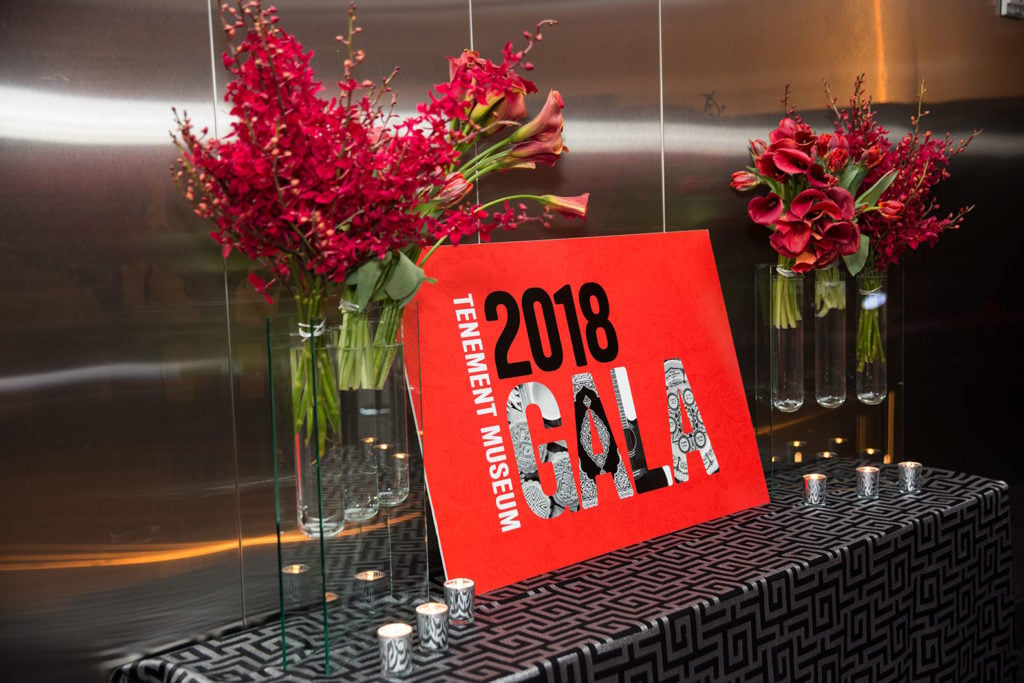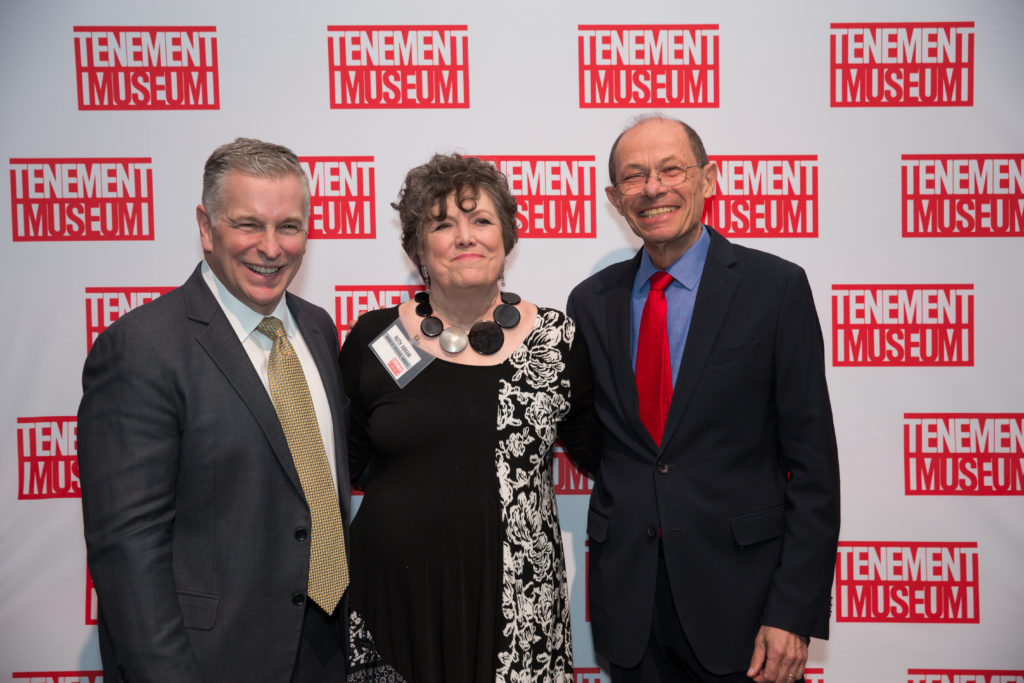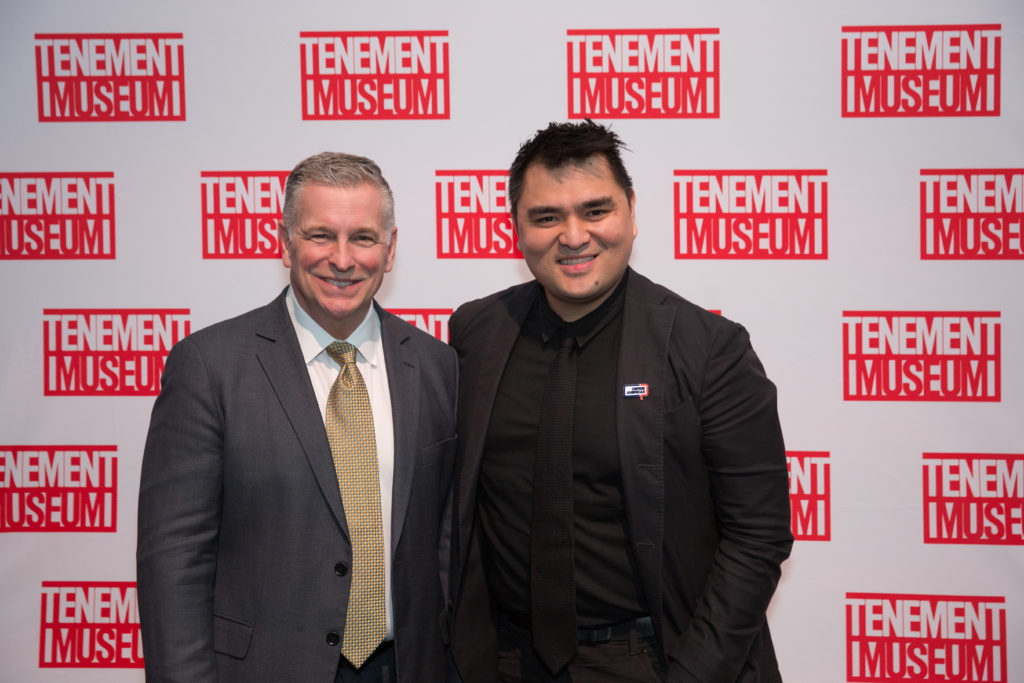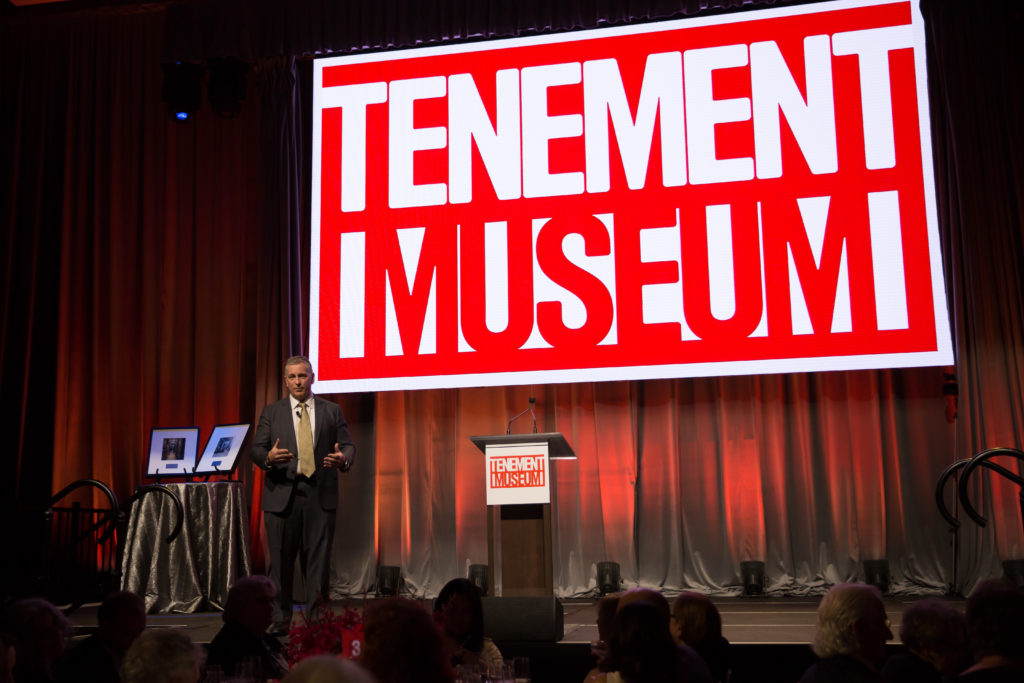Blog Archive
Tenement Museum Gala 2018 Recap!
April 27, 2018


The Tenement Museum’s 3 Presidents: Ruth Abram, Morris J. Vogel & Kevin Jennings together at the 2018 Gala
What a night! The Tenement Museum’s 2018 Gala this week exceeded expectations, celebrating 30 years of the Tenement Museum and raising close to $1 million, which will be used to support the Museum’s ambitious new strategic direction.
The Ziegfeld Ballroom welcomed nearly 500 attendees on Tuesday, a crowd comprised of everyone from leading immigration advocates to New York City politicos.
Jose Antonio Vargas, a Pulitzer Prize winning journalist, leading voice for the human rights of immigrants and one of our Gala honorees, gave an impassioned speech about the need for inclusivity and honesty in our national conversation on immigration and described the role the Tenement Museum must play in today’s debate: “Our immigration past informs the present, which dictates the future.”
It was only fitting that during a celebration of Tenement Museum’s past, Ruth Abram, the founder of the Museum, would also be honored. She received the Founders Award and delivered a speech that looked both back and forward, expressing her pride that the Museum she established 30 years ago has such relevance today.
Other honorees included Paul J. Massey Jr, who previously served as Museum Board chair and The Boston Consulting Group, whose pro bono help was instrumental in developing the new strategic plan for the Museum.

Kevin with Gala honoree Jose Antonio Vargas

Kevin delivers his speech
In his speech outlining this new direction, Tenement Museum President Kevin Jennings stressed the importance of putting a human face on the immigrant experience and rejecting bigotry. Growing up with an uncle and grandfather who were active members of the Ku Klux Klan, he told attendees, “I know what bigotry and ignorance look like.”
“I also know how you overcome them,” he continued.
Kevin outlined the Museum’s plan moving forward to engage millions annually through a range of new initiatives. These initiatives include school curriculum development, Museum partnerships and digital media ventures, such as virtual reality and podcasting. The goal, Kevin says, is to deliver the Museum’s “superpower,” its trademark storytelling approach to educating about immigration, to the masses.
“We plan to educate America on how immigrants built – and continue to build – this nation,” he said.
It’s not too late to support the Gala! You may make a donation here
Kevin’s speech is available in full below:
I’d like to read you an email I got two weeks ago:
“I recently enjoyed the ‘Under One Roof’ tour. I work as a Nurse Practitioner and I couldn’t help but reflect on the lives of Chinese immigrants that we see in the hospital. I have met immigrants who live in illegal buildings with no water and heat. I also had another patient who at the young age of 91 lives with 4 families in an apartment and sometimes sleeps in the hallway due to lack of space. This makes me realize that the immigrant experience is not just one of the past but of the present. “
“The immigrant experience is not just one of the past but of the present. “ The writer’s words reminded me of those of my fellow southerner, William Faulkner: “The past is never dead: it isn’t even past.” Today’s headlines have echoes in the headlines of the past, echoes that remind us that America has often struggled to live up to its ideal of being a place where the tired, the poor, the huddled masses spoken of on the Statue of Liberty could indeed find refuge and build better futures for themselves and their families.
We live in one of those times now, a time in which our country is deeply divided over immigration and many feel we should close our doors to newcomers, some of whom come from unfamiliar lands and practice an unfamiliar religion. The debate too often descends into the language of ignorance and bigotry, language which has no place in America…language I grew up with.
As you might be able to tell from this picture of my mother’s family, our roots are in Appalachia. Not far from my hometown of Lewisville, North Carolina, there was a billboard that I remember well from my childhood. My partner gave me a historic photo of that billboard a few years ago. This is what it said.
My uncle was a member of the United Klans.
I know what ignorance and bigotry look like.
I also know how you overcome them. President Lincoln once said, “I do not like that man: I must get to know him better.” Once you know someone, once you know their story – truly know them, as a fellow human being – it becomes nearly impossible to hate them.
That’s what makes this the perfect time for the Tenement Museum to launch a new phase in its own history. In a time when ignorance pervades the public discourse, our superpower – our ability to tell stories, stories of real people who came to this country to build new lives and, in the process, built a new nation – is the antidote to fear and ignorance.
We know this works. For three decades people have walked the halls of 97 Orchard Street and learned the stories of the Moores, The Baldizzis, the Levines, and the other families that lived there and have left with a new appreciation of what immigrants have done for America. As I often put it, nobody’s life was ever changed by a PowerPoint presentation: stories are what move hearts and minds, stories stir our spirit, stories change our lives. And the Tenement Museum is really good at telling stories.
We now need to reach millions – not thousands – with those stories.
Our new strategic plan, developed with the pro bono help of tonight’s honoree the Boston Consulting Group, will help us take what we have perfected on Orchard Street to the rest of America. We seek to both increase visitorship to our historic buildings on Orchard Street as well as to educate people who may never even visit New York. We plan to use various channels to do so, including:
- In New York State, for example, the study of immigration is required in 4th, 8th and 11th grades. By developing and implementing comprehensive curriculum about immigration, we can potentially reach 400,000 young people in New York State alone each year.
- OK, tell the truth: how many of you have been on your phones tonight? Good. We’re planning to meet you there. Through virtual reality tours, augmented reality programs, podcasts and a host of other device-based interventions, we plan to take the tenement experience to your phone and enable you to learn from us no matter where you are logging on from.
- Every place has its own history, and I believe people are hungry to know where they’ve come from. By using our expertise at telling stories in partnership with museums and historical societies outside of New York, we can help build understanding for our immigrant forbearers in cities across America, just as we do every day here in New York City.
By these and other means we plan to dramatically increase our reach and impact over the next five years, so that we have meaningful interactions with a million people annually. We plan to educate America on how immigrants built – and continue to build – this nation.
To educate more people, we’ll need substantially more resources. I know you’ve already been generous, but we’re hoping to raise an additional $200,000 to kick off some of the new initiatives I have spoken of tonight. The Zegar Family Foundation is putting up the first $25,000 we need to reach that goal. On your table there are pledge cards. I hope you’ll consider making a special gift to help us educate even more Americans in the years to come.
I believe in the power of education. Education took me from a trailer park on an unpaved dirt road in an unincorporated town in rural North Carolina to Harvard, where I became the first member of my family to graduate from college. Education changed my world, and I know it can change lives. Help us reach into the heart of America, and—through the use of education and the telling of stories — replace fear and ignorance with appreciation and respect. Thank you.
Post by Jas Chana, Media & Communications Manager at the Tenement Museum